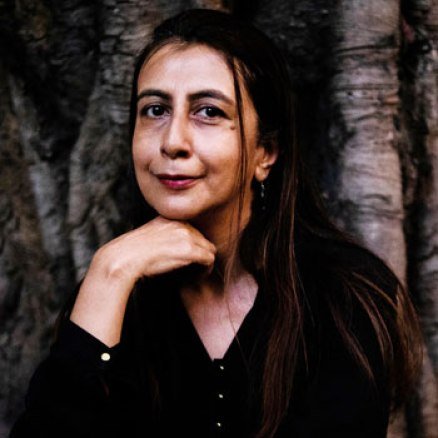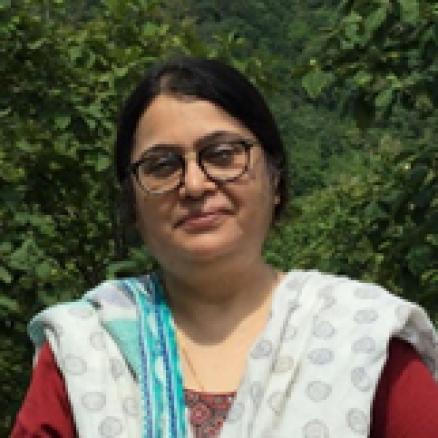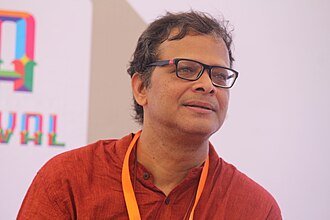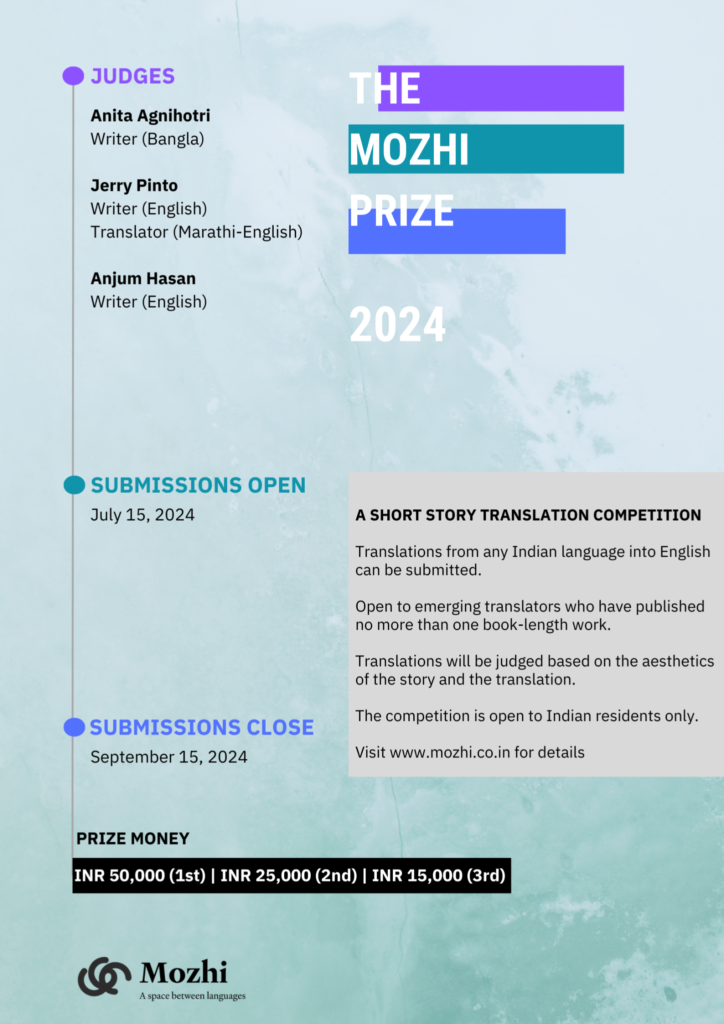- Results
- Judges’ Citation
- A Note From Mozhi
- Shortlist
- Longlist
- Rules
Winners
| Prize | Translator | Title | Source language | Author |
| 1st (INR 50,000) | Jaideep Pandey | Kallo | Urdu | Sameena Nazir |
| 2nd (INR 25,000) | Malini Bhattacharya | Aangurlata | Bengali | Bimal Kar |
| 3rd (INR 15,000) | Kamalakar Bhat | Lord Cornwallis and Queen Elizabeth | Kannada | Abdul Rasheed |
Special mentions
(Each translator wins a special mention prize of INR 5,000)
| Translator | Title | Source language | Author |
| Indira Chandrasekhar | Temple Chariot | Kannada | Dadapeer Jyman |
| Uma Shirodkar | Wife-Eaters | Marathi | Bhau Padhye |
11/12/2024, Wednesday
Announcing the longlist for the Mozhi Prize 2024!
We are delighted to announce the longlist for the Mozhi Prize 2024. We received 120 unique entries. This year we received submissions from many languages of India — Kannada came out on top, with 29 entries.
Going by our usual process, we gave equal weightage to the quality of the translation—particularly looking for translations with creative, inventive solutions to problems posed by the source text—as well as the aesthetic quality of the story selected for translation in coming up with the longlist. In general, we believe we have identified translations that we thought were sensitive to the verbal and emotional nuances of the original story and attempted to render the artistry of the original in English.
At the end of the reading period, we are very happy to share that we have a longlist of 19 amazing stories from across languages, geographies, and time periods. Congratulations to the longlisted translators! Stay tuned for the shortlist announcement later this month.
The Mozhi Prize 2024 – Longlist
| Title of the translated story | Source Language | Translator | Author of the original story | Year of publication of the original story |
| A Bikeless Action Hero | Marathi | Aakash Karkare | Manaswini Lata Ravindra | 2012 |
| Tejimola | Assamese | Ananya Khaund | Lakshminath Bezbaruah | 1911 |
| The Brew | Assamese | Anindita Kar | Bonti Senchowa | 2009 |
| The Beggar Sahib | Bangla | Hiranmoy Lahiri | Prabhat Kumar Mukhopadhyay | 1899 |
| Temple Chariot | Kannada | Indira Chandrasekhar | Dadapeer Jyman | 2020 |
| My Name | Tamil | Iswarya. V | B. Jeyamohan | 2000 |
| Kallo | Urdu | Jaideep Pandey | Sameena Nazir | 2022 |
| Lord Cornwallis and Queen Elizabeth | Kannada | Kamalakar Bhat | Abdul Rasheed | 2021 |
| Aangurlata | Bangla | Malini Bhattacharya | Bimal Kar | 1957 |
| Photographer of the Dead | Marathi | Mahesh Sowani | Mahesh Sowani | 2022 |
| Gadal | Hindi | Neeta Agarwal Doshi | Rangeya Raghav | 1950 |
| Prize for Paapa | Tamil | Samyuktha Gorrepati | T. Janakiraman | 1954 |
| Irani Pulao | Hindi | Sejal Arora | Krishn Chander | 1976 |
| The Greatest Wonder | Hindi | Sneha Pathak | Dinesh Pathak | 1979 |
| The Wife-Eaters | Marathi | Uma Shirodkar | Bhau Padhye | 1981 |
| This Story of Murder Warrants No Title | Hindi | Vaibhav Sharma | Mithilesh Priyadarshi | 2022 |
| High Tide | Hindi | Varsha Tiwary | Sanjeev | 2006 |
| Lifetime | Tamil | Vasundhara S | A. Muttulingam | 2001 |
| My Daughter, A Woman | Malayalam | Vibha Venugopalan Rekha | N S Madhavan | 1993 |

Anjum Hasan
Reading the best stories submitted for the Mozhi Prize, range and diversity, those two cliches we habitually associate with Indian literature, come to mind and must be dismissed. Instead, a couple of other aspects stood out for me in this list. One is small-time lives. Most characters here are, poignantly, trying to get by, make do, protect their scraps of dignity, from time to time breaking out in minor but arresting meditations. Also running through many stories is the full, oppressive weight of patriarchy but in those written closer to our time we begin to hear men reflect on masculine desire and violence. Finally, the malleability of English impresses, how in the most skilled hands – admittedly rare but in evidence in this list – it can become a colloquial Indian tongue.

Anita Agnihotri
Being a member of the jury in the Mozhi Prize has been a very enriching experience for me as a writer as well as a reader of literature. In its fourth episode, the competition has become very significant with over one hundred entries being received. As a jury member I read nineteen stories in the longlist after the Mozhi team did a great background work of preparing the longlist . The stories I read belong to different languages, times and socio political contexts. For me it was like a travel through time and country, vivid in cultural and social landscapes, with myriad hues of human emotions. The dimensions of gender, caste and class made the reading experience all the more relevant and reconfirmed my trust in the strength and depth of Indian literature. Many of the shortlisted stories stories like Kallo, Angurlata, Gadal, Temple Chariot have powerful women protagonists and reflect deep understanding of realities of caste, class and the all encompassing patriarchy in India. The Mozhi Prize continues to make a very substantial contribution to Indian literature in translation.

Jerry Pinto
It was deeply gratifying to be judging the Mozhi Prize. It meant spending time with the short story, which as a form is a formidable challenge for writers. To find oneself in the midst of intense discussions about what constitutes a good story and a good translation was very satisfying.
Launching: The Mozhi Prize 2024
About the competition:
The Mozhi Prize is a literary fiction translation prize awarded for the translation of short stories from an Indian language into English. Through this prize, we seek to provide a platform for emerging translators with a passion for the craft. We also hope to bring attention to the wealth of literature in Indian languages and the art of fiction translation.
Over its first two editions, the Mozhi Prize has received close to 300 submissions from across 18 different source languages. Our impressions on the previous editions are recorded in our notes from the respective years. It gives us immense joy to note that many of our shortlisted translators have gone on to work on book-length projects and win other prestigious awards.
We immensely value the curatorial pursuit of the translator and therefore continue to place emphasis on the aesthetic quality of the story, aside of the quality of the translation. We therefore invite participants to choose stories that are fresh, inventive and questful.
We look forward to reading the submissions!
Who can apply:
- Individuals or a team of not more than two translators can apply. There is no age limit.
- This initiative is aimed at discovering emerging translators and hence we ask that you should have published no more than one book-length translation as of the date of submitting your entry. If you have been published in any other form, or are yet to publish, you are welcome to apply.
- We require the translator to be an Indian tax resident. Unfortunately, we are no longer able to accept translations from others due to administrative constraints with respect to payment of prize monies.
- We request winners of the top three prizes from previous editions of the Mozhi Prize to kindly refrain from participating.
Panel of judges:

Anjum Hasan is a novelist, short story writer, poet, and books editor. She was born in Shillong, Meghalaya, and writes in English. Her works include the poetry collection Street on the Hill, which was pubslished by the Sahitya Akademi. Her debut novel Lunatic in my Head was shortlisted for the Crossword Book Award 2007. Hasan’s second novel entitled Neti, Neti was longlisted for the 2008 Man Asian Literary Prize and shortlisted for The Hindu Best Fiction Award in 2010. Her short-story collection, Difficult Pleasures, was shortlisted for The Hindu Literary Prize and the Crossword Book Award. Anjum Hasan’s latest novel History’s Angel was published to critical acclaim. She has been a Homi Bhabha Fellow, a Charles Wallace Writer-in-Residence, and a New India Foundation Fellow. She served as literary editor at the investigative and cultural magazine, The Caravan.

Anita Agnihotri is a Bangla writer and poet. Her literary oeuvre spans poetry, novels, short stories, writing for children and critiques of development. Her writing has been translated into several Indian languages and also German and Swedish. Anita’s writing explores the vast and complex Indian reality, many facets of human relations, and brings out the unheard voices of the marginalized and the underprivileged. Agnihotri is the recipient of many awards, some of which include Vidyasagar-Dinamayee Puraskar 2022 by the Government of West Bengal, Pratibha Basu Smriti Puraskar 2016, and Sahitya Setu Puraskar. Anita returned the Bangla Academy Somen Chanda Puraskar award in protest of the killing of innocent people in Nandigram. Her collection of stories, Seventeen, translated by Arunava Sinha, won the Economist Crossword Book Award for Indian Language Translation in 2011. She joined the Indian Administrative Service in 1980 and served as Secretary to the Government of India in a distinguished career spanning three-and-a-half decades.

Jerry Pinto is a poet, writer, editor and translator. He is the author of Em and the Big Hoom, a novel that won him The Crossword Prize, the Hindu Lit for Life Award and the Sahitya Akademi Award. In 2016, he was awarded the Windham-Campbell Award for Fiction from Yale, USA. His other novels, Murder in Mahim and The Education of Yuri were also widely acclaimed. Apart from writing in English, he is an accomplished translator working between Marathi and English. He has translated Daya Pawar’s path-breaking autobiography Baluta, Sachin Kundalkar’s debut novel Cobalt Blue, Mallika Amar Sheikh’s I Want To Destroy Myself among others. Pinto has two books of poetry, Asylum and I Want a Poem and Other Poems, as well as children’s books to his credit. He has taught journalism at the postgraduate Social Communications Media course of the Sophia Polytechnic, Mumbai for more than thirty years.
What to translate:
- Any short story written in a non-English Indian language, for which you have obtained permission to translate from the rights holder
- Word count in English up to 7,000 words
- We allow re-translations of works that have already been translated with a justification for why it is being re-translated and what you are looking to do differently.
- Please do not submit excerpts from novels / novellas, we are looking for a self-contained story within the word limit mentioned above.
- Please submit only one story per entrant.
- The translation should not have been published anywhere else.
- The jury’s decisions will be final and binding
- On grounds of fairness, we will not accept translations of stories written by any of the members on our jury or the founders at Mozhi.
Other information:
- Style: Translation should be as self-contained as possible; please avoid glossaries or footnotes unless absolutely necessary.
- Format of submission: Word document, 12pt, double spaced. Please mention the title of the story, the name of the author and your name on the first page.
- Selection criteria: Since our focus is on encouraging literary translation, the selection criteria will accord significant weightage to the literary/aesthetic quality of the story, apart from the quality of the translation itself.
- Translation rights: We ask that you have obtained the translation rights from the rights holder prior to submission. A self-declaration will be required during the submission process. In addition, we will ask for a copy of the confirmation from the rights holder at the appropriate stage of the competition.
- Publication: Mozhi will have the first rights to publish the shortlisted entries digitally and/or in print form (subject to rights from the rights holder being available in writing).
How to enter:
Please submit here.
Prizes:
1st Prize – INR 50,000
2nd Prize – INR 25,000
3rd Prize – INR 15,000
Prizes sponsored by The Mozhi Trust
Timelines:
Last date for submission: 15 September 2024, 11.59pm IST.
Winners to be announced – 31 December 2024
Please write to mozhispaces@gmail.com if you have any questions.
We look forward to your entries!
Team Mozhi

We are delighted to announce the shortlist of the Mozhi Prize 2024. Congratulations to all the shortlisted translators!
The winners of the Prize will be announced by the end of the month. Please follow our page and our Twitter (X)/Instagram handle @mozhispaces for updates. Thank you!
The Mozhi Prize 2024 – Shortlist
| Title of the translated story | Source Language | Translator | Author of the original story | Year of publication of the original story |
| Temple Chariot | Kannada | Indira Chandrasekhar | Dadapeer Jyman | 2020 |
| My Name | Tamil | V. Iswarya | Jeyamohan | 2000 |
| Kallo | Urdu | Jaideep Pandey | Sameena Nazir | 2022 |
| Lord Cornwallis and Queen Elizabeth | Kannada | Kamalakar Bhat | Abdul Rasheed | 2021 |
| Aangurlata | Bangla | Malini Bhattacharya | Bimal Kar | 1957 |
| Gadal | Hindi | Neeta Agarwal Doshi | Rangeya Raghav | 1950 |
| The Greatest Wonder | Hindi | Sneha Pathak | Dinesh Pathak | 1979 |
| The Wife-Eaters | Marathi | Uma Shirodkar | Bhau Padhye | 1981 |
| This story of murder warrants no title | Hindi | Vaibhav Sharma | Mithilesh Priyadarshi | 2022 |
Hello, and wish you a happy new year!
After an intense reading period and some spirited discussions among the judges, we are delighted to announce the results of the Mozhi Prize 2024.
This time we built on the format that we had settled on last year. The competition was open to translators across the country working to translate short fiction from any Indian language into English. While most of the rules remained unchanged, we expanded our definition of an ‘emerging translator’ to include those who may have published up to one book length work in English.
We received a total of 120 entries. Though this was nearly 40% lower than the number of submissions last year, we were encouraged by the marked improvement in the quality of translations. We received entries from 15 source languages, including less visible languages such as Odia, Manipuri, and Nepali. While Hindi has been the most represented language across editions of the Mozhi Prize, we were happy to see Kannada topping the list this time with 29 entries . Bangla, Tamil, and Malayalam were relatively well represented with more than 10 entries each. Submissions from Marathi, Telugu, and Assamese also increased from last year. Additionally, the number of young translators grew, with 58% of the submissions coming from those under 40 years of age.
Some trends remained unchanged, though. Same as last year, ~61% of our applicants identified as women, 38% as men and 1% as non-binary. Despite ongoing challenges in obtaining translation rights, we were pleased to see that approximately 70% of the stories submitted were written within the past 25 years. The enduring appeal of good fiction was underscored by early stories such as The Beggar Sahib (1899) and Aangurlata (1957) making it to the longlist. Equally, we were impressed by the subtle and artful hand with which recent stories such as Kallo (2022), and Lord Cornwallis and Queen Victoria (2022) dealt with the modern preoccupation of identity and forbidden love.
The two of us, and our intern, Aaranya Swaminathan, read all 120 entries. As announced, we took into account both the quality of the original story and the translation in arriving at a longlist. At Mozhi, we accord equal importance to both aspects with a view to celebrating the role of the translator as a curator and not merely a purveyor of words. It was reassuring to see translators choose stories with emotional depth, fine characters, and detailed world-building such as The Brew (Bonti Senchowa) and Gadal (Rangeya Raghav), particularly from writers who are relatively undiscovered in English. We hope to see more such distinctive stories in future editions.
Using this approach, we arrived at a longlist of 19 entries. Our panel of judges, Anjum Hasan, Anita Agnihotri and Jerry Pinto each read all 19 entries, scoring them independently on the same two dimensions mentioned above. This was followed by a series of engaging discussions on the merits of each entry. You can read more about their experience in the citation page. We are grateful to the judges for their generous investment of time and effort in the Mozhi Prize.
And finally, our congratulations to all the winners and special mentions!! We will soon publish the winning entries, stay tuned to read the stories and learn more about the authors.
Best,
Suchitra & Priyamvada
Team Mozhi
All prizes are sponsored by The Mozhi Trust.



